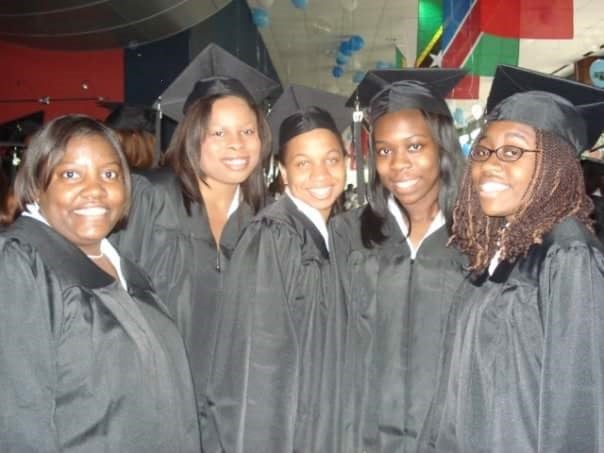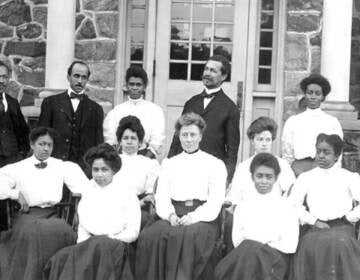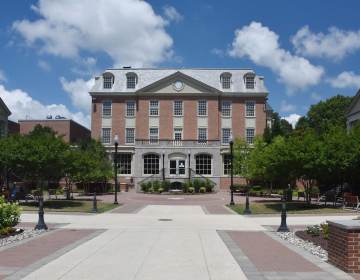Carrying forward my family’s HBCU legacy with four years of Black Girl Magic
Spelman instilled a sense of purpose and confidence in me and my sisters. Those years influenced my mission to give back through my career and my community engagement.

Deanna Jenkins (center) is shown with some of her class of 2007 Spelman classmates. (Image courtesy of Deanna Jenkins)
“Tell Them We Are Rising: The Story of Black Colleges and Universities,” premiering Feb. 19 on PBS, explores the pivotal role these institutions have played over the course of 150 years in American history, culture, and identity. WHYY is presenting a screening and conversation about the film on Feb. 13. Panelist Deanna Jenkins offers her perspective as an HBCU alumna.
—
By the time I was 10 years old, I knew that I wanted to go to a historically black college.
Anyone who knew me growing up wouldn’t be surprised by this statement at all. Several of my family members were proud alumni of HBCUs, including my mother, who graduated from Spelman College, a historically black liberal arts college for women in Atlanta. My uncle (and my extended family) attended Livingstone College, a private historically black college in Salisbury, North Carolina.
Although born and raised in Philadelphia, they frequently visited my grandparents’ family in South Carolina, where they were exposed to the segregation and racism all too prevalent before the passage of the Civil Rights Act of 1964. Attending HBCUs gave them opportunities to pursue degrees in environments where they were supported, protected, and reaffirmed. Ultimately, my mother and uncle earned their degrees at HBCUs and pursued graduate studies in education and social work at predominantly white institutions (PWIs), respectively.
Born and raised in Philadelphia, I grew up with my mother’s college yearbooks and stories about her college experience and her time in Atlanta. My mother, now a retired second-grade teacher, set high standards for education from a very early age. In my house, going to college wasn’t an accomplishment — it was the expectation.
While I was excited about the idea of attending an HBCU, it didn’t stop the criticism from some people.
“Why would you want go to an HBCU? You’re not going to find any diversity there. It won’t prepare you for the real world!”
Nevertheless, my mind was made up.
I applied to several colleges during my senior year in high school — HBCUs and PWIs. I seriously considered all of my options, but in the end, it all came back to Spelman. Excited and nervous, I left for Atlanta in August of 2003 with all of the concerns many incoming freshmen have: What will I major in? Will I fit in? Did I make the right choice?
My anxieties disappeared almost immediately when I arrived on campus. Before we had even finished orientation, I’d met so many intelligent and ambitious young women, many of whom I still consider close friends. Some would become first-generation college graduates. Others were second- and third-generation HBCU students who turned down acceptance letters from the Ivy League. We came from different backgrounds, experiences, and perspectives, but now we were bonded to a community and legacy bigger than all of us.
In our freshman year, we were required to take a class called “African Diaspora and the World,” focusing on the history and contributions of Africans and people of African descent above and beyond what we’d read about in our high school textbooks. For many of us, it was the first time we felt comfortable enough to openly discuss race, or to speak on uncomfortable topics without hesitation and judgment. We could be ourselves unapologetically in an environment specifically for us as women of African descent.
The following years, cultivated academic experiences honed our skills and encouraged our professional goals. We built relationships with our professors that would reaffirm our value and worth, while challenging us at every step to prepare for the expectations (or lack thereof) placed on us outside of the campus gate. My Spelman sisters and I made lifelong friendships with students from Morehouse College, Clark Atlanta University, and other colleges in the Atlanta University Center Consortium, which is the largest adjacent consortium of African-Americans in higher education in the U.S.
Spelman helped us develop leadership skills and a passion to serve. We came to understand our responsibility to speak out for those without our platforms, whether through volunteering for local nonprofits or supporting grassroots advocacy. Friends of mine educated fellow students about reproductive rights, established new programs, advocated criminal justice reform, and challenged the portrayal of women of color in mainstream media.
In essence, I was able to take for granted witnessing Black Girl Magic first hand, long before it became a hashtag.
Spelman helped me find my own voice: I became a campus writing tutor and a newspaper editor. I faced my fear of public speaking by leading presentations at Spelman for a nonprofit that promoted financial literacy to Atlanta-area college students. By the time we walked across the commencement stage and received our degrees, we knew that we weren’t those same young women from orientation. We were Spelman women, committed to changing the world and bettering our communities.
When I look back on my time at Spelman, I see how much those four years shaped my adult life, and they continue to impact me every day. It was a place where I saw the best of myself and what I could become. Spelman instilled a sense of purpose and confidence in me and so many of my sisters. And those years influenced my mission to give back through my career in health care and my community engagement.
It’s the reason why so many HBCU graduates like me go back for homecoming and fully intend to encourage future generations to attend HBCUs. Far beyond the tailgating, social media posts, and step shows — we are literally going back home. Although I was fortunate to be part of an HBCU legacy before I stepped on campus, I graduated with an extended family far beyond my wildest dreams.
—
A Philadelphia native, Deanna Jenkins graduated magna cum laude from Spelman College with a B.A. in history and earned her M.S. in health systems administration from Georgetown University. She currently works as a business process analyst at AmeriHealth Caritas. In addition to her work in healthcare management experience, she serves on boards and committees for several non-profits, including the Philadelphia chapter of New Leaders Council, The Junior League of Philadelphia, Mental Health Partnerships, and SeniorLAW Center.
WHYY is your source for fact-based, in-depth journalism and information. As a nonprofit organization, we rely on financial support from readers like you. Please give today.




